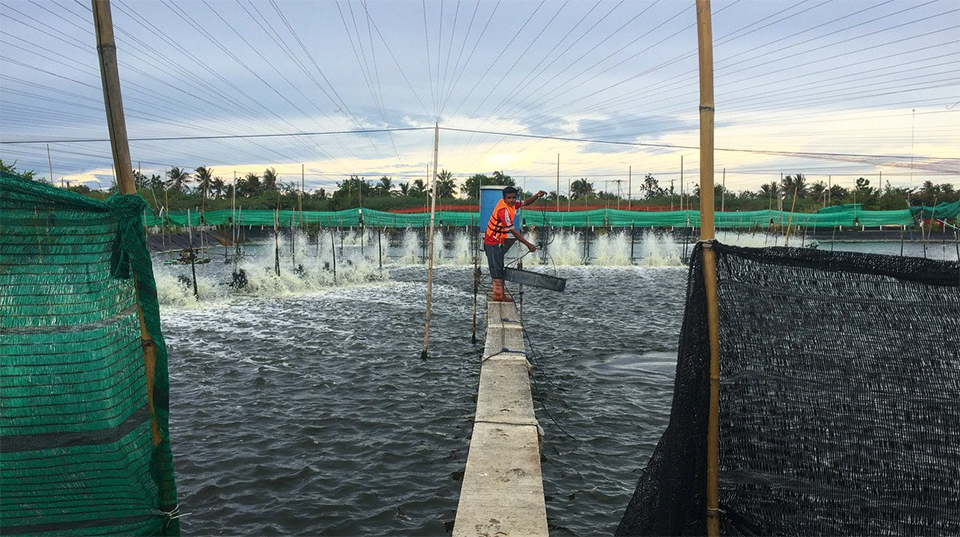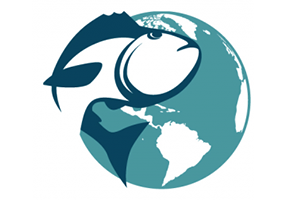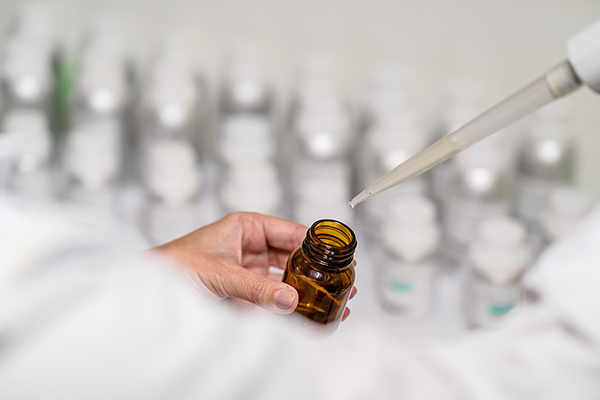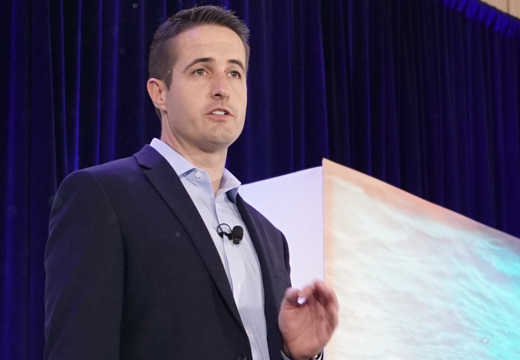Laure Boissat discusses seafood initiatives and investor impact

As consumer demand grows for more sustainable, ethical and transparent seafood, the industry is under increasing pressure to deliver. Laure Boissat, Oceans Program Manager at the FAIRR Initiative, is helping steer that transformation – working with a global network of investors to push for greater accountability in the blue food sector.
Boissat joined FAIRR in 2023, bringing experience from both the NGO and consulting worlds. She now leads FAIRR’s investor engagements on sustainable aquaculture and seafood traceability, with a focus on reducing biodiversity risks and improving transparency across complex supply chains.
As one of the panelists at this year’s Blue Food Innovation Summit, Boissat spoke with the Advocate about FAIRR’s recent traceability findings, the evolving policy landscape and what she hopes to highlight in London.
Tell me about your role at FAIRR.

I’m the Oceans Program Manager at the FAIRR Initiative, an investor network made up of over 400 members, representing more than $75 trillion in assets under management. It’s a relatively large network that includes some of the biggest asset owners and managers globally.
Our role is to inform investors about the risks and opportunities in the global food system. We focus much of our research on the animal protein value chain, since that’s where most climate and biodiversity risks emerge.
I lead FAIRR’s two investor engagements related to oceans. One is on salmon aquaculture, where we encourage major producers to move away from using wild-caught fish in feed and diversify their feed ingredients. The second focuses on seafood traceability, which I’ll be speaking about at the Blue Food Innovation Summit. So I get to work directly with both investors and companies to drive change in the sector.
What excites you most about working in the blue food sector, particularly regarding sustainability and innovation?
Looking at food production in general is critical – not just for a sustainable future for the planet, but also for a growing global population. The FAO has projected a 75 percent increase in aquaculture production by 2040. They talk about sustainable aquaculture, but the opportunity now is for all stakeholders – investors, companies, everyone involved – to help define what that actually means.
The timing feels right for progress. There’s growing investor awareness around nature-related risks and the importance of protecting biodiversity, both on land and in the oceans – with frameworks like the Taskforce on Nature-related Financial Disclosures (TNFD) helping to drive that shift.
It’s also important to acknowledge the challenges in achieving sustainable aquaculture – but what’s new is the shift toward finding and scaling the solutions. We’ve got enough awareness about the problems. I’m excited to be part of solution-oriented discussions.
What progress are you seeing on seafood traceability, and where is investor pressure making a difference?
I’m encouraged that investors are recognizing traceability as a key issue – not just from an environmental perspective, but also a social one. We need traceable supply chains to help prevent overfishing and illegal, unreported and unregulated (IUU) fishing, which still accounts for around 20 percent of all fish caught. It’s also critical for addressing forced labor in the seafood supply chain.
At FAIRR, our seafood traceability engagement has brought together 35 investors representing $6.7 trillion in assets under management. We’ve held dialogues with seven of the largest seafood companies – four Japanese conglomerates, Thai Union and CP Foods in Thailand, and Nomad Foods, based in the UK.
The engagement has been very positive. All seven companies recognized traceability as a material issue. The next step is turning that recognition into clear commitments – and making sure those commitments are implemented.
From a standards perspective, the Global Dialogue on Seafood Traceability (GDST) is a promising platform. They continue to evolve their standards, and right now, we see them as the best-practice benchmark for full-chain, digital, and interoperable traceability.
There’s growing momentum in this space. We’re seeing more actors step in to help connect the dots between traceability standards like GDST and the operational needs of big seafood companies. We look forward to seeing continued progress – and to keeping our investor network informed along the way.
How is human rights due diligence evolving in seafood supply chains, and what role does traceability play in that?
We’ve published the Seafood Traceability Engagement Phase 1 Progress Report, which covers the results from the first year of our engagement, and there’s a specific section looking at the global policy landscape. What we’re seeing is increasing scrutiny when it comes to both food safety and traceability.
From a human rights perspective, the risk comes from a lack of traceability – without that certainty, companies can’t demonstrate to investors that their supply chains are free from issues. That opens the door to two key risks: regulatory risk, if a company is found to have labor rights violations and reputational damage. At FAIRR, with investors as our focus, we make sure they’re aware of these evolving regulations and the implications.
Overall, we’re seeing a tightening of policies around the world, and investors are increasingly aware of the regulatory and reputational risks tied to the absence of full-chain traceability.
What’s the key takeaway from FAIRR’s Seafood Traceability Engagement Phase 1 Progress Report?
The top headline is that, over one year, we had support from 35 investors and held dialogues with six of the seven companies we targeted – some of the largest in the seafood sector. But while all seven companies recognized traceability as a material issue, only two of them have traceability commitments that cover both their operations and feed procurement. And even in those two cases, reporting on the implementation of those commitments is still quite limited.
So the main takeaway is this: while there’s broad recognition of the importance of traceability, very few companies have comprehensive commitments in place – and implementation remains a challenge.
We’re now opening sign-on for Phase 2, the second year of this engagement. The aim is to continue our dialogues with these companies and go deeper – understanding the barriers they face in making and implementing strong traceability commitments, and how investor influence and capital markets can help drive progress.
What can attendees expect of your panel at the Blue Food Innovation Summit?
I’m excited to highlight the GDST standard as a practical and important toolbox. It’s something companies and investors can look to in terms of the type of data being collected, and it also helps us better understand the real-world challenges companies face when it comes to implementation.
We’ll also have a company representative on the panel, and I’m sure they’ll share examples – perhaps involving smaller digital traceability providers – which should bring helpful insights into how we can move the needle on traceability. The seafood sector is massive, and the supply chains are highly fragmented and complex. That makes it even harder than some land-based commodities when it comes to traceability.
My main takeaway for the audience is this: traceability matters. It helps mitigate risks like overfishing, IUU fishing and forced labor. And ultimately, increased investor confidence leads to increased holdings and long-term financial performance.
Now that you've reached the end of the article ...
… please consider supporting GSA’s mission to advance responsible seafood practices through education, advocacy and third-party assurances. The Advocate aims to document the evolution of responsible seafood practices and share the expansive knowledge of our vast network of contributors.
By becoming a Global Seafood Alliance member, you’re ensuring that all of the pre-competitive work we do through member benefits, resources and events can continue. Individual membership costs just $50 a year.
Not a GSA member? Join us.
Author
-

Lisa Jackson
Associate Editor Lisa Jackson is a writer who lives on the lands of the Anishinaabe and Haudenosaunee nations in Dish with One Spoon territory and covers a range of food and environmental issues. Her work has been featured in Al Jazeera News, The Globe & Mail and The Toronto Star.
Related Posts

Responsibility
App aims to bring clarity to seafood traceability, social compliance data
For small-scale aquaculture farmers in far-flung regions, creating traceability data can present major challenges, both linguistic and technological. It’s those challenges that VerifiK8 is poised and ready to help solve.

Intelligence
GDST recognizes first software products for interoperable digital traceability
The Global Dialogue on Seafood Traceability said three tech vendors and a platform have digital traceability products to implement GDST standards.

Intelligence
‘Through science, there’s no question’: How evidence-based transparency is changing seafood traceability
ORIVO, a science-based testing and certification service for the global feed and supplement industry, aims to change seafood traceability.

Intelligence
Seafood tracking companies unite to simplify data sharing, improve seafood traceability standards
Seafood traceability solutions providers Trace Register and Wholechain have connected their two tracking systems.


